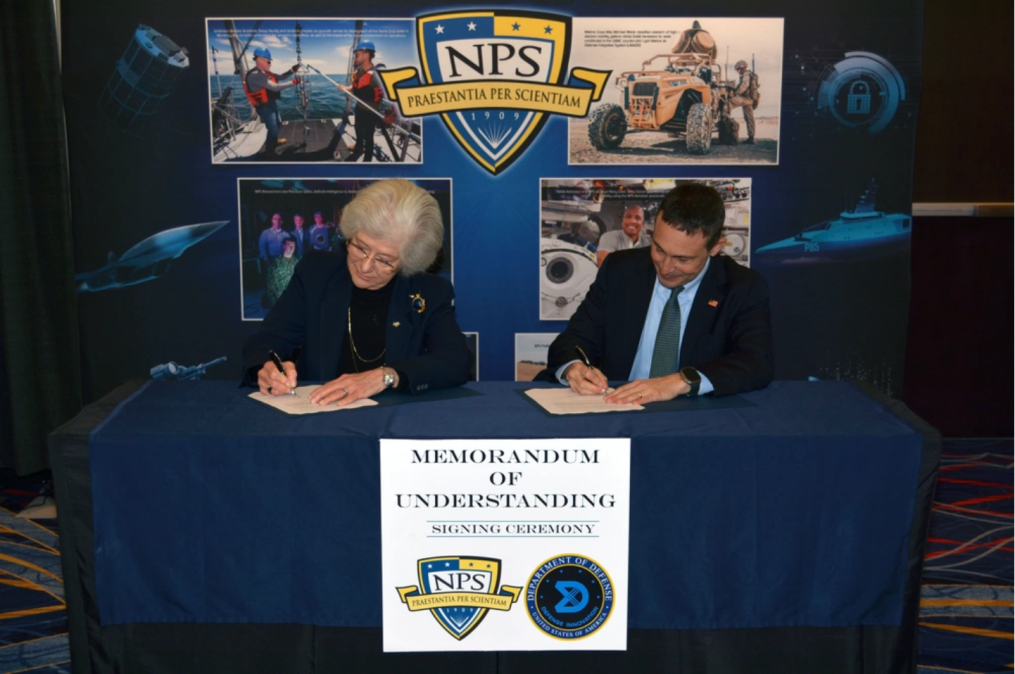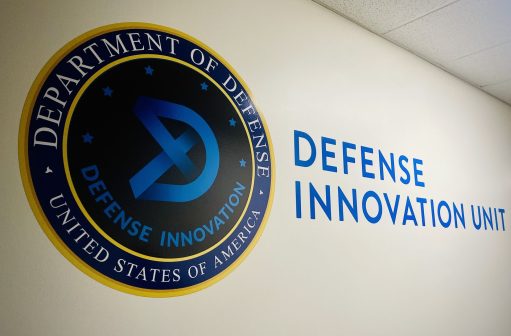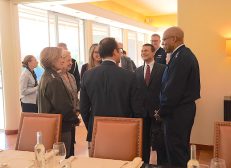DIU, Naval Postgraduate School partner up to prototype tech, exchange talent

The Defense Innovation Unit and the Naval Postgraduate School are officially set to deepen their existing partnerships and expand collaborative prototyping and experimentation pursuits, through a new memorandum of understanding that the two organizations’ leaders signed Tuesday.
DIU Director Doug Beck and retired Vice Adm. Ann Rondeau, president of NPS, briefed DefenseScoop on this new MOU and what it means for each of their hubs, after co-signing the official document during a ceremony on the sidelines of the Navy League’s Sea-Air-Space conference.
“This is about putting the concrete pipes in place that make it easy for us to move ideas, people and even money, to be able to make things happen at speed. Both of these organizations, in very different ways, are made up of incredible talent. And this is about helping that talent to come together and solve problems, and it’s also about making it possible for that talent to flow seamlessly back and forth, as appropriate, between the organizations and to the rest of the fleet — and really the rest of the department — in order to help solve problems down the road,” Beck told DefenseScoop.
Generally in the U.S. government, MOUs are legally non-binding agreements that describe the intentions, roles and responsibilities of the agencies involved and the partners they opt to formally cooperate with.
DIU and NPS jointly aim to “accelerate adoption of commercial dual-use technology solutions, while enhancing the advanced education of defense leaders necessary to employ them,” officials wrote in an announcement about the new agreement.
After signing the document at the conference, Beck and Rondeau told DefenseScoop about how some of their staff have already been embarking on “talent exchanges” through which they embed inside their partner’s organization.
“We’ve got people on our team at DIU already — in the last month — that are coming aboard from NPS. And I envision us doing a lot more of that over time, because that both will help us to cross-pollinate now, but even more importantly, it helps us to develop that talent for the long-term force,” Beck said.
Rondeau reiterated that this MOU does not mark the beginning of strategic collaboration between the Defense Department’s Silicon Valley-headquartered innovation hub and the Navy’s flagship technical graduate school that she leads.
“We’ve been doing this now for a while. So we are talking about fellowships, we are talking about experimentation — we have a lot of that going on. And we’re talking about [conducting] some prototyping and some sandboxing. And then there’s this whole notion about helping us with the mindset and the culture of naval innovation that will walk into the Naval Innovation Center once it’s built,” Rondeau said, referring to the in-the-works education facility first unveiled by Navy executives in late 2022.
The retired three-star noted that she’s looking forward to continuing the discussions she’s been having with Beck since he left Apple last year to take the helm of DIU.
While he spent much of his career at the tech sector giant, Beck also simultaneously served as a Navy Reserve captain and previously taught as an adjunct lecturer at NPS.
He told DefenseScoop that the hands-on collaboration that will be underpinned by this new MOU fits into his overarching plan to help the Pentagon and its components “learn to think differently about risk” as they enter this next chapter that he’s conceptualized as “DIU 3.0.”
Broadly, DIU 3.0 seeks to deliver military technology prototypes at the speed necessary to deliver the strategic effect required by contemporary warfare.
“When I came home from Iraq and Afghanistan, one of the things that I realized was that most of what I spent my entire career thinking of as ‘risk’ really isn’t — it was uncertainty. Risk is risk to the mission, risk to force, and strategic risk for the nation. And what we have to do is ensure that we are taking the right kinds of risks — process risks, financial risks and reputational risks so that we avoid transferring that into real risk for the sailors, soldiers, airmen, guardians and Marines who are going to fight the wars if we are unable to deter them. And so that really is what this is all about,” Beck said.






